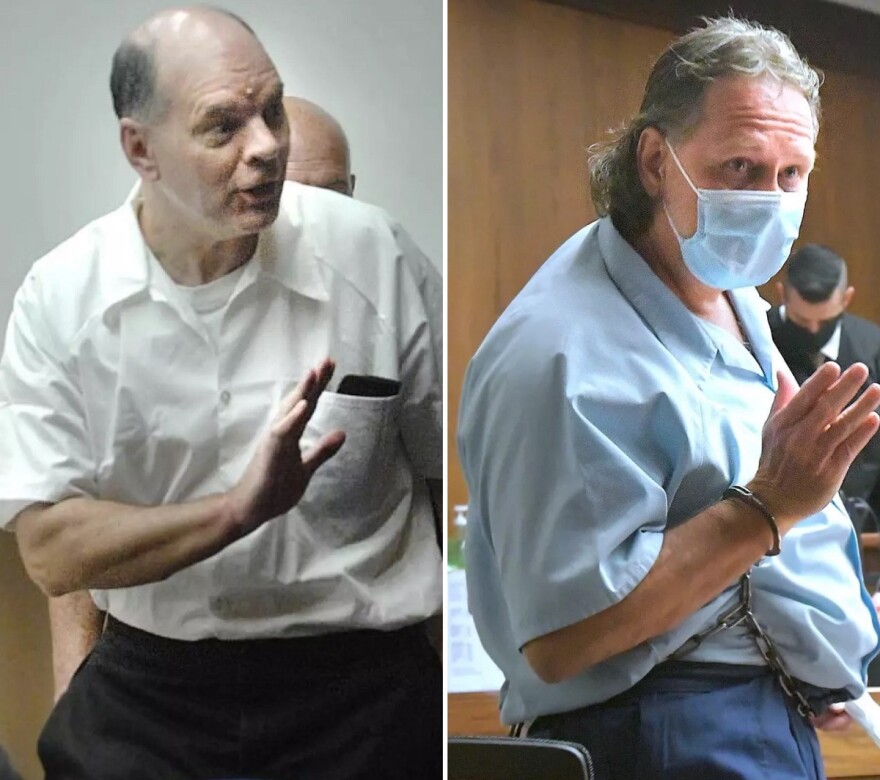Supporters of two men embroiled in decades-long court battles to challenge their McLean County murder convictions hosted a rally Thursday to raise awareness of a number of wrongful conviction cases filed in the county.
The "Does Innocence Matter?" rally featured remarks by Patrick Pursley, a Rockford man convicted in 1993 on flawed testimony from a state firearm and tool mark examiner. He was acquitted in a bench trial in 2019 and released after serving 24 years for a murder he did not commit.
Pursley’s request for firearm testing was denied in 2001 because DNA was the only available form of evidence testing. In 2006, he wrote an article while in segregation on how testing of weapons could be conducted. That process became the basis for a state law for testing that led to his release.
Many post-conviction cases “are on a fast track to nowhere,” Pursley told a crowd of about 35 people in Bloomington. It would take another seven years after the testing for Pursley to be released.
Rally organizers highlighted the Jamie Snow and Bart McNeil cases. Both men are serving life terms for unrelated deaths; Snow was convicted in 2001 of shooting gas station attendant Bill Little and Bart McNeil was found guilty in the 1998 suffocation death of his 3-year-old daughter.
Common to the cases highlighted during the rally was the involvement of former state’s attorney Charles Reynard, who later became a McLean County judge.

Snow supporter Tammy Alexander gave a timeline of Snow’s case, starting with his arrest a decade after Little’s death. A dozen witnesses at Snow’s trial have recanted their testimony, said Alexander, noting “no physical evidence has linked Jamie to this crime.”
Snow and McNeil are both represented by lawyers with innocence projects, teams of attorneys who work without pay to assist defendants with innocence claims.
In Snow’s case, lawyers were recently in court for a hearing on thousands of pages of documents the defense contends Snow’s lawyers did not have during his trial. A motion for DNA testing on evidence has been pending for years in Snow’s case as lawyers review police reports which contain potential new evidence.
Attorneys for McNeil are waiting on a ruling from a hearing held in May on potential new evidence in his case. The decision Judge William Yoder anticipated would take about two months has been pending more than four months. Yoder has agreed that McNeil is entitled to a hearing on DNA evidence uncovered since the defendant’s bench trial, but the defense is seeking a hearing on a range of other issues that could exonerate McNeil.
McNeil contends his ex-girlfriend, Misook Nowlin, who was later convicted of killing her mother-in-law, was ignored by police as a suspect in his daughter’s death. The two had just ended their relationship and evidence during her murder trial showed a propensity for violence and rage against former lovers.
Advocates for Snow and McNeil point to three other murder cases where questions have been raised, including the case of Alan Beaman, whose conviction in the strangulation death of his former girlfriend was reversed in 2008 by the Illinois Supreme Court.
Other defendants cited by the group include Eric Drew, who pleaded guilty to second-degree murder in a 1998 shooting after the Fourth District Appellate Court granted him a new trial. He served 11 years before his release. In another case handled by Reynard, Donald Whalen was granted a new trial on murder charges, but that decision was overturned on appeal. He served his 30-year prison term for stabbing his father in 1991 at a downtown Bloomington bar.
Whalen attended the rally and explained how authorities fought to delay testing on a bloody pool cue found at the scene. The palm print was later tested and a defense expert could not eliminate the victim as a contributor to the print. That evidence, said Whalen, “was the nail in my coffin.”
“It’s about time Reynard’s era of misconduct comes to a head,” said Whalen.
Three of Snow’s five children spoke about the loss of their father during their early childhood.
Nicole Snow was not quite 7 when her father was convicted. “I’ve been advocating for my Dad’s innocence since the first grade,” she said.
In comments directed to newly-appointed State’s Attorney Erika Reynolds, Alexander said “this is your mess. This is your problem to fix.”
Andy Schiltz, a member of the jury that acquitted Snow’s co-defendant, Susan Claycomb Powell, spoke on Snow’s behalf. Snow, he said, lacked effective counsel and was wrongfully convicted on the testimony of unreliable witnesses.
According to the National Registry of Exonerations, 3,249 people have been exonerated in the U.S. since 1989. Many served decades before they were released.




